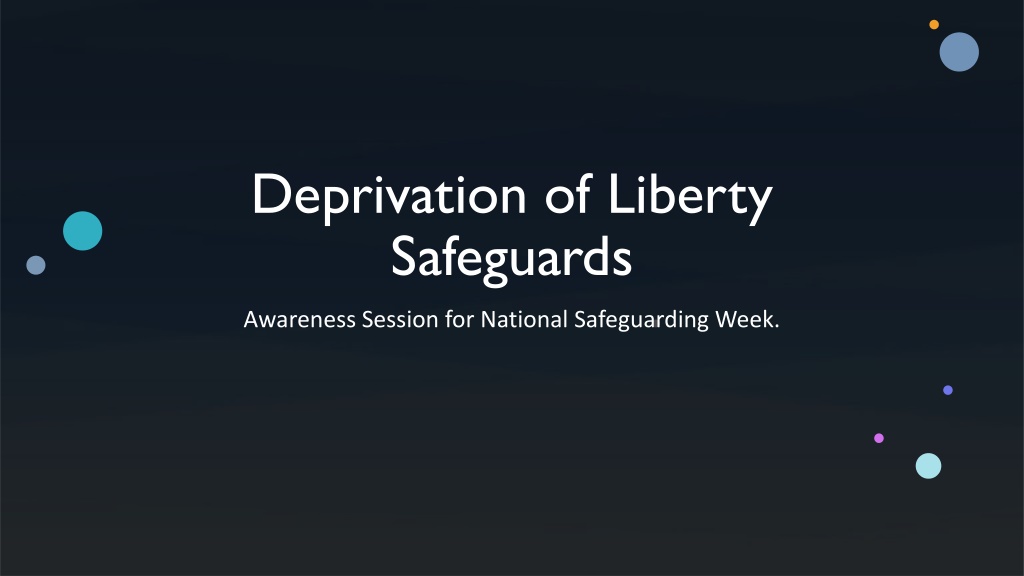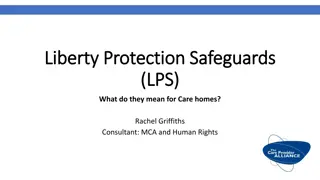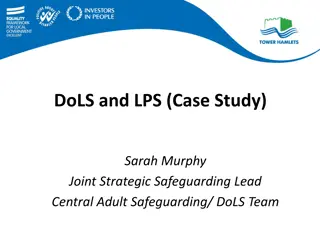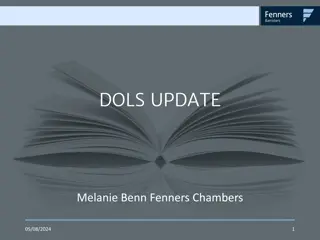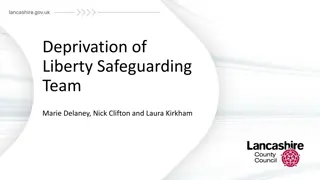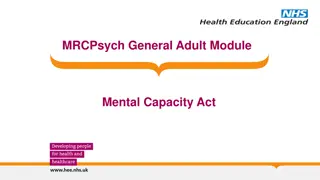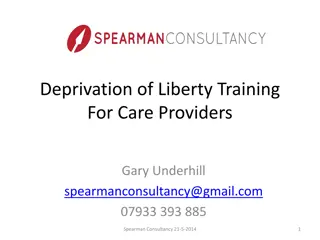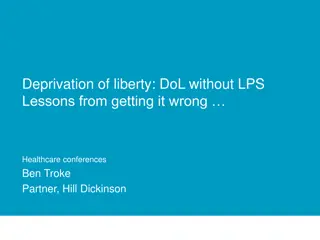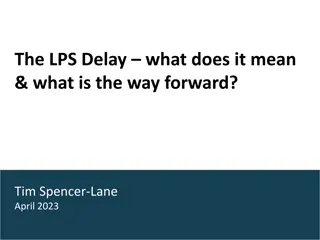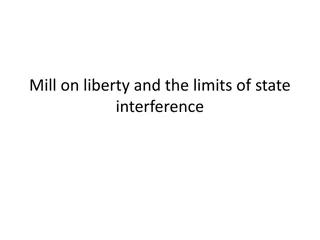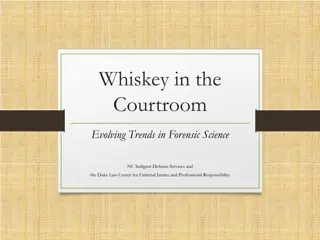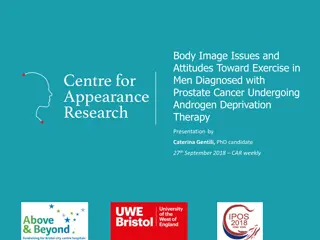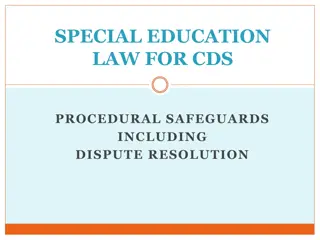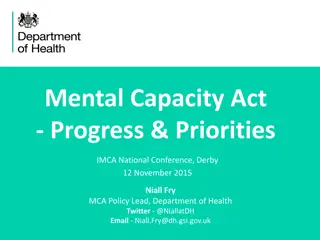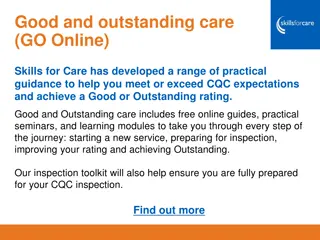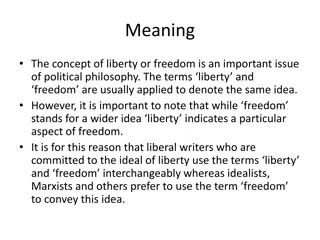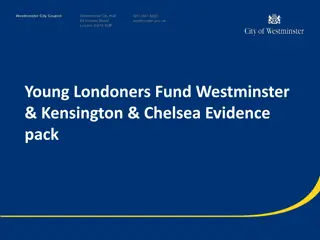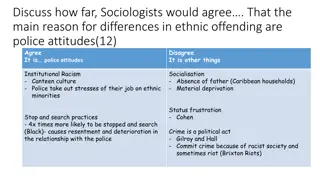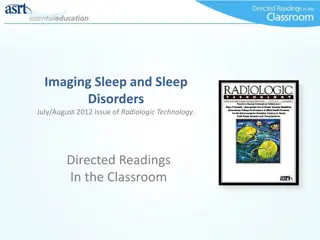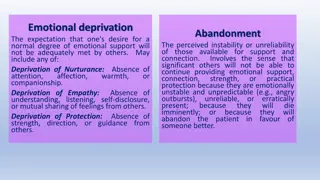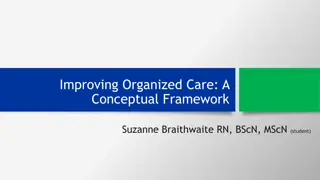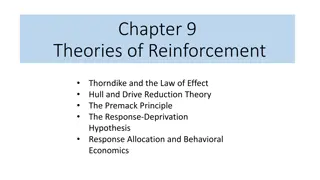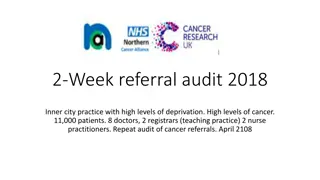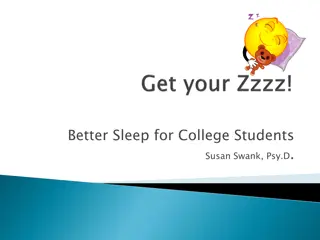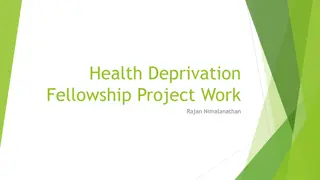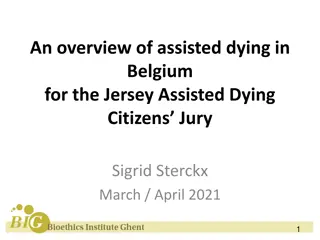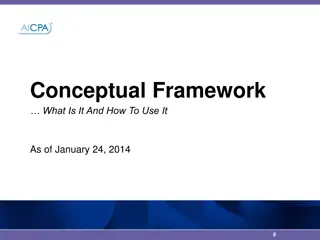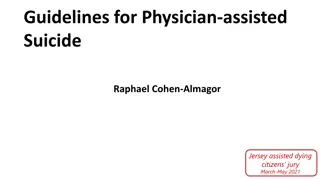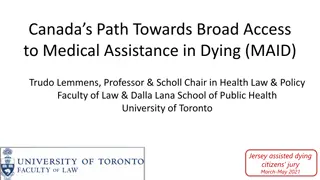Understanding Deprivation of Liberty Safeguards (DoLS) in Care Settings
Deprivation of Liberty Safeguards (DoLS) is an essential provision in the Mental Capacity Act 2005 to protect the rights of adults lacking mental capacity. It ensures that individuals in care homes and hospitals are not unlawfully deprived of their liberty. The DoLS process involves assessments by Best Interest Assessors to determine the necessity of restrictions in the person's best interests. The Cheshire West and Chester Council v. P (2014) case further clarified the criteria for determining deprivation of liberty, emphasizing the need for safeguards and rights for individuals with disabilities. Various examples illustrate how individuals may be deprived of liberty in care settings, highlighting the importance of balancing care and protection with personal freedom.
- Deprivation of Liberty Safeguards
- Mental Capacity Act
- Best Interest Assessor
- Cheshire West
- Safeguarding
Download Presentation

Please find below an Image/Link to download the presentation.
The content on the website is provided AS IS for your information and personal use only. It may not be sold, licensed, or shared on other websites without obtaining consent from the author. Download presentation by click this link. If you encounter any issues during the download, it is possible that the publisher has removed the file from their server.
E N D
Presentation Transcript
Deprivation of Liberty Safeguards Awareness Session for National Safeguarding Week.
What is Deprivation of Liberty Safeguards(DoLS)? Deprivation of Liberty Safeguards is an amendment to the Mental Capacity Act 2005. The MCA s primary purpose is to provide a legal framework for acting on behalf of and making decisions with or for adults who lack the mental capacity to make particular decisions for themselves. The person must have an impairment of the mind or brain. The Human Rights Act (HRA) tells us that no one can be deprived of their liberty by the state, without review of their circumstances. The MCA provides a legal framework to do this within. The MCA allows some restraint and restriction to be used however this must be in the adult s best interests. Dols relates to people in care homes and hospitals who are deemed to lack capacity to make decisions in relation to care and treatment. Deprivation of Liberty Safeguards assessments must be completed by a Best Interest Assessor(BIA).
Why? https://www.google.com/url?sa=t&rct=j&q=&esrc=s&source=web&cd=&cad=rja&uact=8&ved=2ahUKEwj3- Z7P_5v7AhXMYcAKHU- ND24QwqsBegQICBAE&url=https%3A%2F%2Fwww.youtube.com%2Fwatch%3Fv%3Dpz5Ecovjs4w&usg=AOvVaw 0Pww184lWJ2aFnSumwq9-w
Continued Following on from The Bournewood Judgement, The Supreme Court further considered the question of deprivation of liberty in 2014 following the case of Cheshire West and Chester Council v P [2014]. The judgement given by Lady Hale sought to give the same rights to those with a disability as to those without and from which was derived The acid test . It prescribed in more detail what a Deprivation of Liberty is and considers whether a person is deprived of their liberty. It asks: 1. Is the person free to leave? 2. Is the person subject to complete or continuous supervision and control? 3.The person must also lack mental capacity to agree to what happens to them in relation to care and treatment. The State must be responsible. Just because the term deprivation of liberty is used it doesn t mean that a care home or hospital is doing something wrong. DoLS is an independent process that considers whether a person needs to be deprived of their liberty for the purpose of care and treatment and whether it can be provided in a less restrictive way. It is a safeguard.
Examples of how people can be deprived Using locks or keypads to prevent a person leaving; Giving medication to calm a person down; Managers saying a person needs to be supervised when they are outside; Restricting a person s contact with family and friends, including if they could harm someone; Physically stopping a person from doing something when they could have injure themselves or someone else; Removing items from a person which could harm them; Holding a person so they can be given care or treatment; Using bedrails, wheelchair straps or splints; Needing close supervision when they are at hospital/care home; The person has to stay somewhere they do not want to be. Delivering personal care for someone who is not happy to receive this 1-1 support. Should a person go out their return will be monitored.
Assessing Mental Capacity. In order to decide whether an individual has the capacity to make a particular decision you must answer two questions: Stage 1 Is the person unable to make a particular decision (the functional test)? Stage 2 Is the inability to make a decision caused by an impairment of, or disturbance in the functioning of, a person's mind or brain? The MCA says that a person is unable to make their own decision if they cannot do one or more of the following four things: Understand information given to them Retain that information long enough to be able to make the decision Weigh up the information available to make the decision Communicate their decision this could be by talking, using sign language or even simple muscle movements such as blinking an eye or squeezing a hand. Every effort should be made to find ways of communicating with someone before deciding that they lack capacity to make a decision based solely on their inability to communicate.
Mental Capacity Lack of capacity may not be a permanent condition. Assessments of capacity should be time and decision specific. You cannot decide that someone lacks capacity based upon age, appearance, condition or behaviour alone. You must also have regard for The Principles of the Mental Capacity Act Principle 1: A presumption of capacity. ... Principle 2: Individuals being supported to make their own decisions. ... Principle 3: Unwise decisions. ... Principle 4: Best interests. ... Principle 5: Less restrictive option
Video mental capacity Using Mental Capacity Act: Self-advocates from Taking Part - YouTube
Process The Residential or Nursing Home or Hospital who are the Managing Authority should tell family members initially that they are intending to make an application for an authorisation. This is called a Standard Authorisation. It is possible to request an Urgent Authorisation also. All requests are sent to the Local Authority, the Supervisory Body, where the person normally lives (ordinarily resident) and the Local Authority will process the request. This is normally who is funding the placement or where the person was living before their admission to hospital or care home. A Form 1 should be completed and sent to The DoLS team via email DOLS@knowsley.gov.uk Please be aware that there is a back log, but if it is an urgent referral please phone the DoLS team on 443 2914.
DoLS assessments There are 6 assessments within the DOLS assessment . A Section 12 doctor will complete the mental capacity assessment and mental health eligibility section. The BIA will complete the age, no refusals and best interests and less restrictive sections of the DoLS. They will also contact the family. Please note that if there is a LPA for health and welfare, they have responsibility for making decisions and will be contacted. Each assessment will include speaking to the person, a carer/ interested persons and looking at the care plan/ hospital notes. The assessment will then be written up and after authorisation by a senior manager in the Local Authority, a Form 5 will be sent to the representative (LPA or family member) and the hospital/ care home for their records.
The Best Interests Assessor must consult with those who are called an Interested Person. This could be the person's partner (spouse or civil partner) children or step children parents and step parents brothers and sisters, half-brothers and sisters and step brothers and sisters grandparents Court appointed Deputy Donee of a lasting power of attorney
Whats next? LPS Liberty Protection Safeguards draft currently Changes include: 16- and 17-year-olds will come within the LPS framework While DoLS applies only to people in care homes and hospital, LPS will also apply to people in supported accommodation, Shared Lives accommodation and their own homes. LPS will apply to the arrangements for the person s care, so can consider a wider range of settings a person accesses providing a more comprehensive consideration of their lives. NHS hospitals will be the responsible body for managing the process for their patients CCGs or Local Health Boards will be the responsible body for managing the process for people primarily looked after by them (i.e., under continuing healthcare arrangements out of hospital) The evidence of mental disorder does not need to be renewed afresh at every authorisation.
continued For most cases, the decision to grant an authorisation under LPS will be made following a pre- authorisation review, which will be a review of the required documentation, without a best interest assessor (BIA) going out to see the person or their carers. BIAs will cease to exist. They will be replaced by Approved Mental Capacity Professionals (AMCPs), who will only be involved in specified cases if people are not wanting care/ treatment in the place they are residing. Authorisations will last for a maximum of one year for the first authorisation and the first renewal. Subsequent authorisations can be for up to three years (providing the renewals are continuous). There is no confirmed date at this time when LPS is replacing DoLS although October 2023 has been stated recently.
